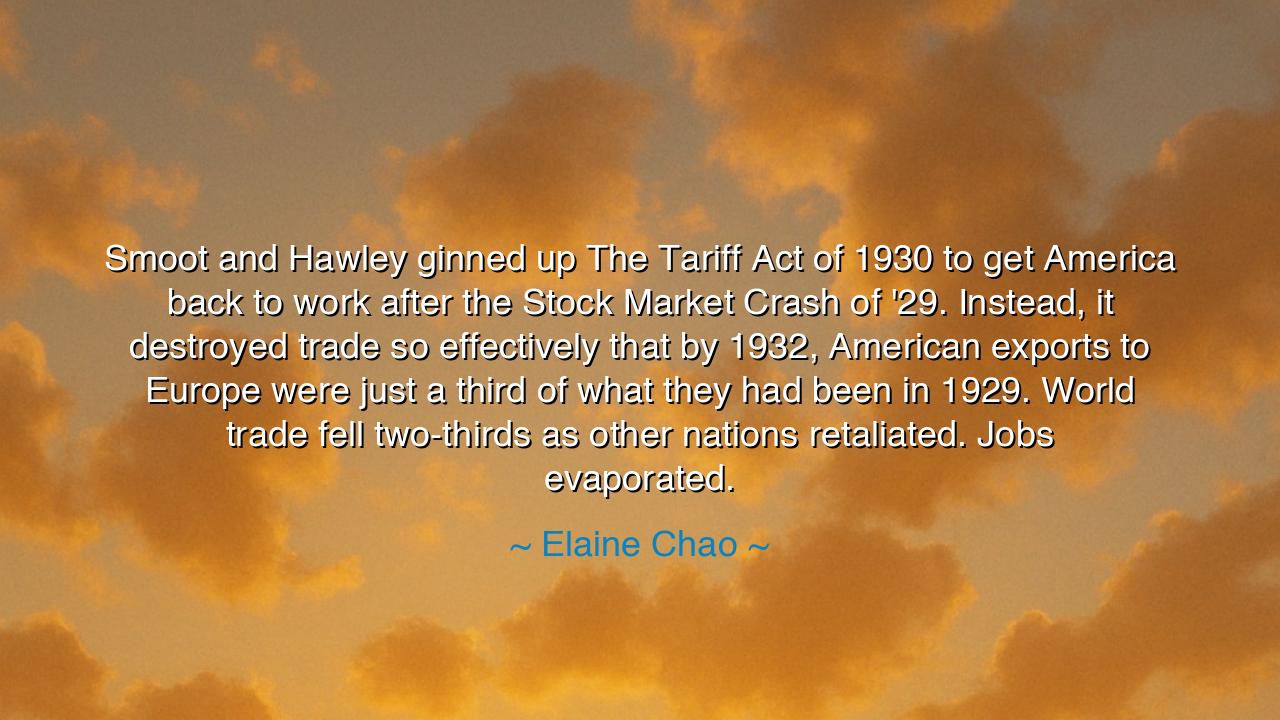
Smoot and Hawley ginned up The Tariff Act of 1930 to get America
Smoot and Hawley ginned up The Tariff Act of 1930 to get America back to work after the Stock Market Crash of '29. Instead, it destroyed trade so effectively that by 1932, American exports to Europe were just a third of what they had been in 1929. World trade fell two-thirds as other nations retaliated. Jobs evaporated.






Hear now the sobering words of Elaine Chao, who declared: “Smoot and Hawley ginned up The Tariff Act of 1930 to get America back to work after the Stock Market Crash of ’29. Instead, it destroyed trade so effectively that by 1932, American exports to Europe were just a third of what they had been in 1929. World trade fell two-thirds as other nations retaliated. Jobs evaporated.” In these words lies both a warning and a remembrance: that policies born of fear and short-sightedness may worsen the very pain they seek to cure, and that nations, like men, cannot wall themselves off without suffering the price of isolation.
The meaning is clear. In the wake of the great crash, when panic gripped the hearts of men and despair spread across the land, leaders turned to barriers and walls. They believed that by raising tariffs, by closing doors, they would shield their people and restore prosperity. But instead, they strangled the lifeblood of commerce—trade—which is the shared breath of nations. As the walls rose, goods ceased to flow, markets withered, and jobs vanished into dust. What was intended as salvation became a chain of suffering, dragging the world deeper into the abyss of the Great Depression.
The origin of these words lies in the historical folly of the Smoot-Hawley Tariff Act, named for its champions, Senator Reed Smoot and Representative Willis C. Hawley. Their intent was to protect American farmers and workers after the devastation of 1929. But protection turned swiftly to destruction, for other nations, wounded by these policies, struck back with retaliation. The circle of trust that bound nations in commerce was broken, and what might have been recovery became collapse. Chao speaks not only of figures and exports, but of lives broken, of factories stilled, of families thrust into want by the unraveling of the global fabric.
History bears out her warning. For centuries, empires have thrived not through isolation, but through exchange. The Silk Road bound East to West, and from it flourished wealth, knowledge, and innovation. When nations turned instead to suspicion and barriers, they dwindled. Consider the Ming Dynasty’s retreat from global trade, once rulers of the seas, later closed within their borders, their wealth and influence diminished. So too, in the twentieth century, America’s turn inward through Smoot and Hawley harmed not only others, but herself, proving that no nation can prosper alone.
The lesson is luminous: fear-driven policies can breed the very disaster they seek to avoid. The instinct to shut the door, to guard fiercely what is ours, may seem wise in times of crisis, but it is often a trap. Trade is not merely the exchange of goods; it is the bond of trust among nations, the sharing of burdens and blessings alike. To cut it off is to deny oneself the very lifeblood of growth. Leaders must therefore look beyond the passions of the moment and see with long vision, lest they doom their people to greater hardship.
Practical wisdom flows from this. If you are a leader, be wary of choices born only of fear or pride. If you are a worker, understand that your labor is bound not only to your own land, but to the wider world. Seek policies and actions that build cooperation, not retaliation. And if you are a student of history, remember Smoot and Hawley, not as villains, but as a warning—that even well-meaning measures can bring ruin when they ignore the interwoven nature of humanity.
So let Elaine Chao’s words echo as a timeless admonition: walls may protect for a moment, but they suffocate in the end. Only through connection, through exchange, through the openness of nations and peoples to one another, can prosperity endure.
Thus, O children of the future, take this teaching: in times of crisis, do not shrink into isolation. Instead, build bridges of trust, for through shared strength the storms may be endured. Remember always that jobs, trade, and human flourishing are born not of fear, but of unity.






AAdministratorAdministrator
Welcome, honored guests. Please leave a comment, we will respond soon